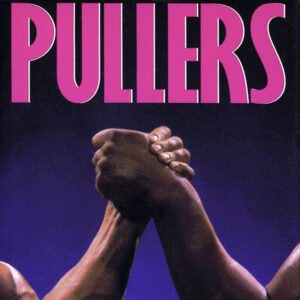calsfoundation@cals.org
Pullers
Tom Graves’s 1998 novel Pullers features rare subject matter: the sport of arm wrestling (participants refer to themselves as “pullers”). The Southern Gothic–style novel opens with an arm-wrestling contest at Bad Bill’s Hawg Trawf in Pine Bluff (Jefferson County). The novel then shifts to Memphis, Tennessee, where most of the story takes place. But characters spend time on both sides of the Mississippi River, enough that Pullers should be regarded both for its Arkansas and Tennessee pedigrees.
The winner of the Pine Bluff contest, Scud Matthews, makes his grand entrance at the event with a much smaller man on a leash, both wearing T-shirts that read: “We’re Queer Dear.” With his use of juxtaposition and stereotypes, Graves is primarily going for laughs while also demonstrating the nonsense of prejudice in all forms; the novel’s swift pacing makes it easy to overlook his perceptive satire and social commentary. Pullers is also unflinching in illustrating everything people love and despise about combat sports, especially those that are practiced on unusual fields of play. In the 1990s in Arkansas and Memphis, arm-wrestling contests were held in backwoods no-name bars and promoted by small-town hucksters. For all of its fictional elements, the book does an admirable job of describing the intricacies at play in an arm-wrestling contest, such as the various grips, the use of leverage, and the different strategies.
The novel’s main character, Carroll Thurston, gives up a promising career in advertising for a bartending gig to pay the bills so he can pursue his dream of becoming a championship puller. As the novel unfolds, other pullers are introduced, each with his own gimmick or memorable quirk, as they compete and make their way to the world competition in St. Louis, Missouri. The competitors exact various shenanigans on each other in order to gain advantage.
Although it is not a crime novel, Pullers contains a criminal subtext involving intentional mismanagement of prize money, questionable characters, and phony events. In the end, though, it is a novel about everyday characters who have singular gifts and not much else going for them. It is written from their perspective, and no trick is too unsavory, no character too loathsome.
Although it was originally accepted for publication by legendary editor Barney Rosset, the book ultimately was published by Hastings House. Tom Graves, a professor of English at LeMoyne-Owen College in Memphis, later wrote a biography of Robert Johnson titled Crossroads: The Life and Afterlife of Blues Legend Robert Johnson. In addition to taking seminal photos of writer Harry Crews in the late 1970s, he also wrote several other books, including My Afternoon with Louise Brooks about silent film cult icon Louise Brooks, and had work published in Rolling Stone, the New York Times, the Washington Post, American History, and the Oxford American.
For additional information:
Baker, Matt. “A Forgotten Classic.” Arkansas Times, July 21, 2016, p. 26. Online at http://www.arktimes.com/arkansas/a-forgotten-classic/Content?oid=4501380 (accessed December 28, 2023).
Matt Baker
Kansas City, Missouri
 Divergent Prosperity and the Arc of Reform, 1968–2022
Divergent Prosperity and the Arc of Reform, 1968–2022 Literature and Authors
Literature and Authors Pullers
Pullers 




Comments
No comments on this entry yet.